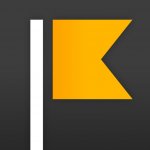
What you should know from the get-go about FreshBooks is the fact that it only has basic accounting tools. A lot of features are minimal or missing, so do your research before committing to any plan. This cloud-based software shines when it comes to invoicing and billing, ease of use, its mobile apps and customer support.

Intuit, the company that developed QuickBooks, is a very reputable and experienced company, on the market since 1983. QuickBooks online is one of the most popular cloud-based accounting software out there. What makes it so appreciated is the fact that it is extremely user-friendly, highly customizable and it comes with a plethora of useful features and hundreds of available integrations.

ClearBooks is a British accounting program, which may cause some frustrations with US based users, because of the date and time format and some other minor differences. ClearBooks includes most of the desired features for accounting, although some of them have annoying limitations. However, it is one of the most affordable software on the market and it definitely deserves a chance.

Kashoo is a simple and user-friendly web-based accounting solution, with a clean interface, mobile support and a decent price. It does lack some advanced features and the app is not yet compatible with Android devices, but for smaller businesses, Kashoo is definitely a good way to go.

FreeAgent is a good option to consider if you are a freelancer or have a small business. On one hand, it includes some really impressive features, such as multi-currency, useful invoicing tools and unlimited users. On the other hand, inventory management and reports are quite limited.

The GoDaddy online bookkeeping software is cloud-based, has mobile apps that are compatible with iOS and Android devices and it is really easy to use. It is tailored for freelancers and small businesses, especially ecommerce ones, thanks to the integrations with Amazon, eBay and others. GoDaddy doesn’t include a free trial and the software only supports one user, which can be a deal breaker for some.

Wave’s biggest strength is of course the fact that it is free. Not only that, but for a free accounting program, it includes a lot of useful features that other providers charge you for. Wave is easy to use, customizable and doesn’t impose annoying limitations. Our only complaint would be the fact that they have slow servers, which could be frustrating, given that it is a web-based solution.

OneUp is quite a strange accounting program, full of extremes. While it is really affordable if you sign up for the lower tiers, their higher tier is one of the most expensive on the market. The program has some impressively complex features, like inventory management and CRM, yet it lacks other common ones: payroll add-on, recurring bills, automated payment reminders. It has very good mobile apps and as an overall conclusion, it can be a valuable choice, depending on your business and accounting priorities.

Sage is an online business accounting and bookkeeping software catered towards different businesses. From small, medium-sized, or even corporates, Sage has features that can be used by each.

Xero is one of the most affordable and widely used accounting software on the market. A lot of users who’ve tried it claim that it is better than QuickBooks, which is a tough competitor to beat. While it does have some shortages, such as limited payroll support and poor customization options for invoicing, this cloud-based program does bring some valuable features to the table: over 500 integration, mobile apps that are compatible with both iOS and Android and a lot of advanced features that are included in their Standard plan.

Zoho Books is a valuable choice especially for small organizations. It is user-friendly, highly customizable and has good invoicing, inventory and bookkeeping tools. It comes with a lot of automated features and an impressive customer support.
Last updated July 5, 2025

The term “accounting software” is pretty self-explanatory. It describes any computer program that processes and keeps track of all the financial aspects of a business/organization.
Accounting software is vital for any type of business/company because it reduces or even eliminates possible human errors and it deals with all the bookkeeping, saving you time and the money you would otherwise spend on hiring an actual accountant.
Besides the accuracy and the cost, there are other advantages in using accounting software: speed of processing, efficiency, security, the useful reporting modules and the diversity of tools they offer: you can pay bills, track inventory, record your income, track your expenses, pay your taxes, send invoices and so on.
All accounting programs have several common functions. Here are the most common:
In addition to the built-in tools of any accounting program, you will also need third-party integrations. The most important ones are payment processing, POS systems, ecommerce, a more advanced inventory management, e-mail marketing and others.
Accounting software can be cloud-based (also known as web-based, online or SaaS) and desktop-based (installed locally on your computer).
The cloud software is very easy to use, it is more affordable and flexible; it has the advantage of being available from any device with a connection to the Internet.
The locally-installed accounting software is usually more complex, secure and more expensive and requires you to download the software (from a link or a disk) and install it on your device. It can also be used offline. Besides the fact that it is more costly, the desktop-based software pretty much ties you down to the device you’ve installed it on, so you lose flexibility.
Accounting software comes in different price ranges, depending on your needs and business size. There are free programs and paid ones. On average, a decent online accounting software will cost you around $30/month. If you need more features you might have to go over $50/month though.
Some examples of popular accounting programs are Xero, QuickBooks, Zoho Books, Wave, FreshBooks, ClearBooks, Sage One. But there many, many more out there.
One question that comes to mind when thinking about using accounting software is ‘How secure are these accounting programs?’. It is a very reasonable concern, because when you are dealing with money and you are looking for an application that has to handle all the FINANCIAL aspects of your business, security is your top priority.
All industry leading and reputable accounting services providers use high level data encryption in order to keep your account protected. Most of them also take additional security measures, such as two-factor authentication and others.

We’ve already covered the advantages of using accounting software for your business: from speed, accuracy and efficiency to cost, security and reporting features, a good accounting program will have it all.
But how do you choose the right software? There are some guidelines you can follow to make your task easier. Here are some of them:
Choose your accounting software based on your needs. Not everyone needs the same features and complexity from an accounting program. If you own a small business that doesn’t require too much financial work, it’s a waste of money to pay $50/month for accounting software. There are some good, trust-worthy and most importantly, FREE programs out there that you can use. Larger businesses with lots of transactions, employees or customers may require a more complex program.
Do you want a cloud-based or a locally-installed program? We’ve already gone through this aspect too, in the Introduction. Both options have their own advantages and disadvantages. Web-based accounting software is easier to use, more flexible and affordable. Desktop-based programs are more complex and secure, can be used offline too, but they are more expensive and lack mobility.
Set a budget and research the market. Figure out how much you can afford and you are willing to spend on such a program and then do a little research to find the best option.
Look for an accounting program that has at least the basic features: invoices, expense tracking, estimates, multiple currencies, mobile apps, at least the basic integrations, product and contact management.
If you are looking for something more complex, you should also aim for software that includes full inventory tracking, budgeting, payroll, tax support and plenty of integrations.
Choose software that is user-friendly. Any respectable accounting software includes a large number of features, tools and functions. If they are not well organized and the interface is not straightforward and intuitive, you’ll only end up wasting your time and money.
Aim for a system that is also mobile-friendly. Make sure your provider also offers mobile support for the program and includes apps that are compatible with both Android and iOS devices.
Choose accounting software that includes good reporting tools.
How secure is the system? We have already explained the importance of a highly secure accounting program. Accounting software has to process and deal with very sensitive and confidential data, finances, and complex calculations. That’s why it is of paramount importance to choose a reputable provider that offers an impenetrable and invulnerable system and uses high-level encryption. Additional security measures are always welcome.
Don’t forget about customer support. Quality customer support is always a necessity, especially when you are working with software and especially if it is cloud-based.